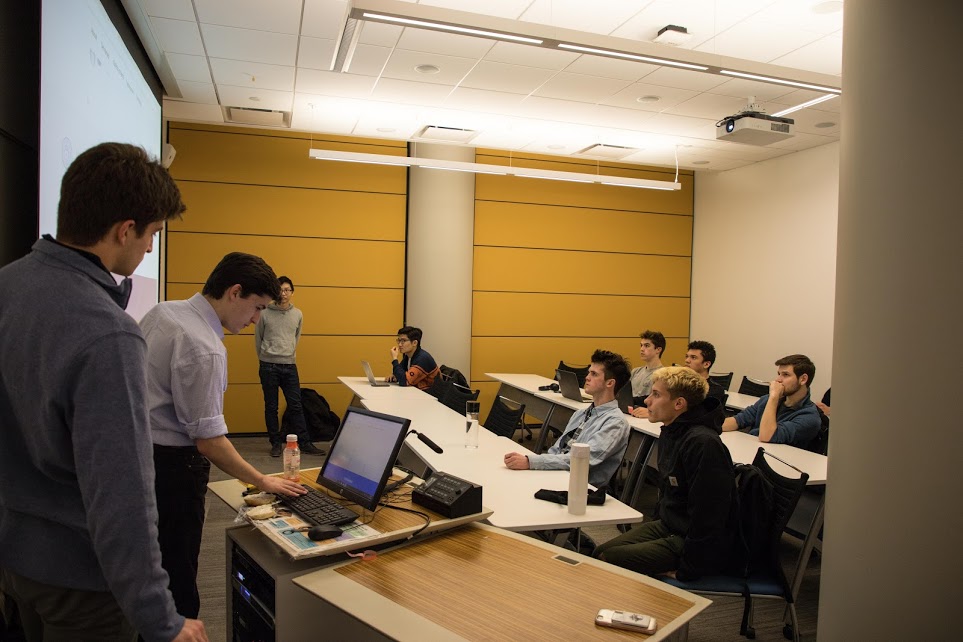By Sam Cronin, news correspondent
In July 2010, the price of Bitcoin rose from a meager $0.0008 to $0.08 per coin. As of Jan. 31, one Bitcoin is priced at $10,067.01. In those eight years, an increasing number of Northeastern students have made and lost money investing in cryptocurrencies.
Cryptocurrencies boast huge rates of return over short periods of time, said Northeastern first-year business administration major Aaryaman Jatia, who has extensive experience trading in cryptocurrency.
“A lot of people buy Bitcoin to shop online,” Jatia said. “The only reason I got into it is for the investment.”
One of the basic principles behind these coins are that they are anonymously traded to protect people’s privacy. They can be traded in online exchanges, such as Coinbase, or “mined” by individuals with dedicated servers they set up exclusively for data mining. They then set those servers to work solving complex mathematical problems, which nets them parts of a Bitcoin or other cryptocurrency.
Jatia began researching cryptocurrency investments when living in India. When he invested his first $500, Bitcoin were already valued at $10,000 per coin. Though his investment did not amount to anywhere near a full Bitcoin, he made nearly 40 percent returns on his investment over approximately three weeks.
“When you see something that catches your eye, you go for it,” Jatia said “It takes a lot of research, and you have to know of when and where you’re investing.”
Jatia later disinvested largely from Bitcoin, moving most of his investment money into a variety of smaller coins such as Ripple and Dentacoin to capitalize on the high potential of initial coin offerings, or ICOs. These cryptocurrencies are rising in value nearly as rapidly as Bitcoin.
When new cryptocurrencies are announced, there are speculative values assigned to them. Investing early in these new coins can yield high returns, as the value quickly goes up when more people invest.
“ICO is where to make money [in cryptocurrency],” Jatia said.
Northeastern students Warren Su and Michael Ioffe formed a club to discuss the topic and instruct others about safe investing practices. They started a group chat in September 2017 to talk about cryptocurrency, and over the course of the last semester they watched with surprise and delight as it blew up into a large student organization.
The Northeastern Cryptocurrency Club has 100 members on Facebook, and founders Su and Ioffe have begun to host guest speakers, lead discussions about crypto and help launch student projects related to the topic. The initial purpose, Ioffe said, was to get people to discuss different currencies they’ve heard of and trade helpful information about their investments.
“Now we teach the software side of it, decentralized apps, smart contracts — lines of code that make up [trading] contracts,” Su said.
Ioffe, a first-year finance and math double major, and Su, a first-year finance major, have cultivated a relationship with Steve Flanagan, a first-year computer science major, to grow their club and expand into new territory.
“Steve started putting much more into it than we were,” Ioffe said. “Now Steve is the face of the club. He puts in the most work.”
Ioffe has been scammed by investing in cryptocurrency and is now passionate about educating others about the potential dangers of getting these investments. Now the club gives lessons to help potential student investors avoid scammers.
“We all shared stories. I invested in an ICO, backed by a real company,” Ioffe said. “That’s one of the most important things is that it’s made by real people [and] you can interact with them. After a couple months, [I] received no word, no money. You have to stay safe out there.”
Apart from the club at Northeastern, Ioffe, Su and Flanagan are all involved in cryptocurrency in other ways.
Ioffe is currently working with a professor in the accounting department researching the future of digital and decentralized currencies. Su works with a business partner to run a data mining venture, and to provide consulting services to businesses about cryptocurrency. Flanagan is building algorithms for cryptocurrency trading, looking for opportunities to profit off coins being listed at different prices on different exchanges.
The Northeastern Cryptocurrency Club is also currently in talks to merge with the Northeastern Blockchain and Cryptocurrency Club. Ioffe is excited by the prospect to grow membership, host more speakers and hold workshops.
“Now, you probably get annoyed with how much people talk about it (cryptocurrency),” he said. “If you don’t know what Bitcoin is you’re out of the loop.”









